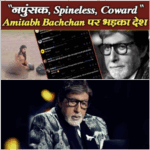Why did Sonu Nigam take enmity with Salman Khan and T-Series Company?
.
.
.
play video:
Sonu Nigam vs Bollywood: Why the Voice of a Generation Took a Stand Against Salman Khan, T-Series, and the Music Industry
“He gave us songs to love, cry, and dream to. But why was one of India’s greatest voices sidelined?”
For decades, Sonu Nigam has been the voice of Indian romance, heartbreak, devotion, and resilience. Often dubbed the “modern-day Mohammed Rafi,” the Padma Shri awardee has contributed timeless melodies to Bollywood—tracks that transcend generations. But despite his soaring talent and popularity, he has found himself at odds with the very industry he helped define.
In recent years, fans have watched with concern as Sonu Nigam’s presence in Bollywood’s playback scene began to diminish. Why would an artist with such universal appeal and unmatched skill suddenly become a fringe figure in an industry he once ruled?
The answer lies in a complex mix of industry politics, power struggles, and the price of speaking out. And at the heart of it are two powerful names—T-Series and Salman Khan.
A Musical Prodigy’s Humble Beginnings
Born on July 30, 1973, in a middle-class family, Sonu Nigam was destined for music. His father, Agam Kumar Nigam, was a professional singer who performed at weddings and parties. From the age of four, Sonu accompanied him on stage, astonishing audiences with his voice and confidence. By the time he was a teenager, it was clear that he had inherited not just talent, but a passion that would define his life.
After completing his education in Delhi, Sonu moved to Mumbai in 1991 at just 19 years old, chasing the dream that had fueled his childhood. He struggled like every newcomer but found strength in his devotion to music and to legends like Mohammed Rafi, whose songs he often performed at stage shows.
His early years saw limited opportunities, but the turning point came with T-Series founder Gulshan Kumar.
The T-Series Connection and a Meteoric Rise
Gulshan Kumar recognized the immense potential in Sonu’s voice and offered him a chance to record a tribute album, “Rafi Ki Yaadein.” The album was a phenomenal success. Listeners found in Sonu a nostalgic echo of Rafi’s soul and a freshness that was entirely his own. With this, Sonu Nigam became a household name.
Through T-Series, he released several devotional albums and bhajans that reached millions. But it was 1995’s “Bewafa Sanam” that skyrocketed his career. The track “Achha Sila Diya Tune Mere Pyaar Ka” became a national anthem of heartbreak and made Sonu Nigam a chart-topping playback singer overnight.
From that point forward, the 1990s and early 2000s belonged to Sonu. Every major film featured his voice—romantic songs, dance numbers, emotional tracks—he could do it all. He was not just a singer; he was a sensation.
The Breaking Point: Royalty Wars and the T-Series Rift
However, the tides turned in 2010, when Sonu Nigam decided to address a longstanding industry issue: royalty for singers.
At that time, music labels paid singers only once for a track’s recording. Despite the song generating revenue for years through streaming, films, and licensing, the singer received no recurring income.
Sonu stood up against this, demanding that singers—like lyricists and composers—be entitled to royalties. His demands were directed especially at T-Series, now run by Bhushan Kumar, Gulshan Kumar’s son. Unfortunately, no other singer publicly supported him.
“Why are singers paid peanuts while music companies earn in crores from our voices?” Sonu asked in interviews and social media posts. He was echoing a concern even Lata Mangeshkar had raised decades earlier, though she too was largely unsupported at the time.
This public confrontation didn’t sit well with T-Series. His ties with the company deteriorated, and slowly, Sonu Nigam was sidelined. Despite his popularity, offers stopped coming. Music labels, fearful of losing power, didn’t want a precedent that empowered artists.
The Salman Khan Fallout
As if the royalty battle wasn’t enough, another controversy erupted in 2013—this time with superstar Salman Khan.
Sonu had recorded a song titled “Hangover” for Salman’s film Kick, produced by Sajid Nadiadwala. Both the singer and the producer were satisfied with the track. But at the last minute, Salman decided to replace Sonu’s voice with his own version of the song.
Though Sonu initially stayed silent, insiders say he was hurt. The matter escalated during a live event where Salman reportedly said:
“I don’t need professional singers to sing for me. I can sing my own songs.”
The jab was widely interpreted as a dig at Sonu Nigam. The singer didn’t retaliate then—but the damage was done.
Their rift became public when Sonu began indirectly criticizing the industry’s nepotism and star dominance. His social media posts, often veiled, pointed to a system where talented artists were being suppressed for speaking up.
Silenced by the System: Banned and Boycotted
As expected, the pushback was swift.
Sonu Nigam was reportedly banned by both T-Series and Zee Music, two of the largest players in the Indian music space. With Salman Khan also turning against him, Sonu’s Bollywood opportunities dried up. Despite fan love and unmatched talent, he was no longer the industry’s favorite.
In a heartbreaking 2017 post, Sonu announced his retirement from Bollywood singing, citing politics, injustice, and creative suffocation.
“I am done,” he wrote. “Music today is not about passion or melody—it’s about compliance. And I cannot comply.”
The Azaan Controversy and Religious Backlash
That same year, Sonu Nigam stirred a fresh storm. In a tweet, he expressed frustration over being woken up by the loud Azaan (Islamic call to prayer) every morning. He questioned the use of loudspeakers in places of worship, calling it “forced religiousness.”
Though his criticism was against noise pollution and not religion, his words triggered nationwide outrage. Some Islamic clerics issued fatwas against him, offering money to anyone who shaved his head and humiliated him publicly.
Sonu, never one to back down, shaved his head voluntarily and held a press conference. “I stand by what I said,” he asserted. “This isn’t about Islam. It’s about noise. The Constitution gives me the right to sleep in peace.”
His clarifications found support among liberal thinkers, including Javed Akhtar, but the damage was already done. More doors shut on him.
The Babri Masjid Remark and Political Fallout
In yet another bold statement, Sonu Nigam spoke about the Babri Masjid demolition, stating that the actions of both Hindus and Muslims were equally wrong.
“Centuries ago, Mughals destroyed temples. That was wrong. But now, if Hindus destroy mosques, that’s equally wrong. Wrong is wrong,” he said.
The statement enraged Shiv Sena, a right-wing party involved in the demolition. The party demanded an apology, and threats followed. But once again, Sonu refused to retract.
Resilience Amid Ruin: A Voice That Won’t Bow
Despite these controversies and the industry’s cold shoulder, Sonu Nigam has refused to disappear. While mainstream Bollywood stopped calling, his live shows continue to sell out globally. From Dubai to New York, fans flock to hear the voice that defined their youth.
He’s also launched his own independent music label, released soulful singles, collaborated with international musicians, and continues to mentor young artists.
His fanbase remains fiercely loyal. They admire not just his music, but his integrity, courage, and conviction.
Final Word: Sonu Nigam—More Than a Singer
In a world where speaking the truth can cost you your livelihood, Sonu Nigam stands tall—an artist who chose integrity over influence, truth over trend.
He could have played it safe, nodded along, and kept singing chartbusters. But instead, he stood up—for his peers, his beliefs, and for the dignity of music.
As his fans say:
“Sonu Nigam is not just a voice. He is a revolution.”
News
Siddharth Malhotra Gets ANGRY & Slapped A Paparazzi for Taking Private Picture of Kiara Advani
Siddharth Malhotra Gets ANGRY & Slapped A Paparazzi for Taking Private Picture of Kiara Advani . . . play video:…
Rekha is diagnosed with cancer, admitted to hospital, Amitabh-Jaya shocked | Fact Check |
Rekha is diagnosed with cancer, admitted to hospital, Amitabh-Jaya shocked | Fact Check | . . . play video: Rekha…
People called Amitabh impotent, angry Indians said they will not forgive him | Public Anger on Amitabh
People called Amitabh impotent, angry Indians said they will not forgive him | Public Anger on Amitabh . . ….
Aaradhya bachchan with daadu amitabh bachchan Jaya bachchan in saari look enjoying Puja at home
Aaradhya bachchan with daadu amitabh bachchan Jaya bachchan in saari look enjoying Puja at home . . . play video:…
Saif Ali Khan revealed about his d#ath, wife Kareena Kapoor was shocked
Saif Ali Khan revealed about his death, wife Kareena Kapoor was shocked . . . play video: Saif Ali Khan’s…
Amitabh Bacchan revealed about his illness, Bachchan family got shocked
Amitabh Bacchan revealed about his illness, Bachchan family got shocked . . . play video: Amitabh Bachchan Opens Up About…
End of content
No more pages to load












